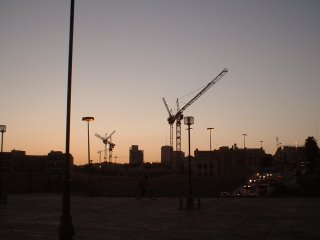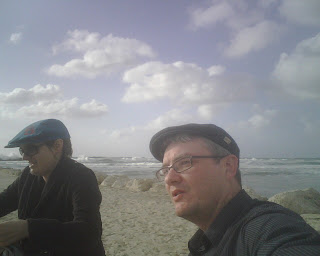 (Photo note: I thought a photo of building in the New City would be an apt metaphore for the rest of the post.)
(Photo note: I thought a photo of building in the New City would be an apt metaphore for the rest of the post.)
Folks, this is a monumental moment. The Abraham Geiger Kolleg at the University of Potsdam, the rabbinical school that I will be attending beginning October 2007, will be ordaining three rabbis at the newly rebuilt synagogue in Dresden on Thursday (September 14, 2006). This is the first rabbinical ordination in Germany since the Holocaust. I want everyone to take a minute (really, please do this) and think about this. Raise your hands if you would have predicted this 20 years ago. Right—me neither. Let there be no confusion about this – this is a testament both to Jews and to Germans. This is a pure and tangible example of healing through all the things that lead to healing—hard work, sweat, necessity, opportunity, and dare I say, a universal and spiritual imperative to heal.
I knew this was coming and knew it was a big deal, but the article that one of our friends in Germany sent us today points to it being understood as a big deal by a much larger community. I had the opportunity last April to meet the man featured in the article, and I believe him to truly be a mensch. Here is the link to the original article, for any that want to check my translation—for everyone else, I just really wanted to share this moment with you, and have you all share this very emotional moment with me:
From “Die Zeit” September 7, 2006.
The Miracle from Potsdam
For the first time in 60 years, since the end of the Holocaust, those trained and educated in Germany will once again be ordained as rabbis in Germany.
That which is happening this coming Thursday in Dresden is actually already exciting enough for Tomáš Kučera. When finally, after three years of study at Potsdam’s Abraham Geiger Kolleg, he is ceremonially ordained in the New Synagogue in Dresden, a lifelong dream will be fulfilled for the graceful 30-something with the gossamer Czech accent and an ever present ironic twinge to his lips. “For me, this was always to be a huge, yet still intimate moment,” says Tom Kučera, as everyone calls him. “In any case that’s what I thought.”
As for the intimacy—that just isn’t going to happen. On the contrary: The entire country will be intently observing Tom Kučera and his two study colleagues, Daniel Alter and Malcolm Matitiani. Travelers from afar—dignitaries and prominent figures and Prime Ministers—will gather in the Dresden Synagogue in a celebration only seen on the highest of holidays. There will be a live television broadcast. The German President, the German Chancellor, and the president of the Bundestag [Germany’s lower house in Parliament] have all sent stirring words to be included in the commemorative volume of the ceremony. All are in agreement, “This is an event of historical significance” (Norbert Lamert). And they are correct in their grand words: It is a caesura when Rabbinical Ordination of those trained and educated in Germany is once again celebrated in Germany six decades after the Holocaust. In 1942, the Gestapo closed the “Hochshule fuer die Wissenschaft von Judentum” (Institution for the Study of Judaism). The Instutition’s last Rector, the great Leo Baeck, would later be sent along with his family to Theresienstadt and then after the war go to London. Since the obliteration and forcible exile of Jewish scholarship caused by the Nazi’s, prospective Rabbis were forced to complete their education in Israel, America, or England. It is befitting that the Dresden ordination represents a “Gift for our country for which scarcely anyone dared hope” (Horst Koehler). Yet now the burden of this historical moment weighs on the narrow shoulders of Tom Kučera. He strives for understatement [of the situation] in order to evade inappropriate pomp. “When I began my studies in Potsdam I really didn’t know that I would be in the first round of graduates,” he asserts. It was a journey with major detours through which he ran into Rabbinical education. The Czech born Tom studied Biochemistry in Goettingen and received a PhD before he went to Vanderbilt in Nashville, Tennessee on a post-doctoral scholarship. Kučera says that as a scientist he was admittedly always one to search for “Meaning.” He never saw his spiritual interests and science as being in conflict. The rational nature of the Jewish religion, with its emphasis on Law its treasuring of scholarly arguments, made the transition [from science to religion] easy.
In light of today’s prevailing voice of celebration it is hard to comprehend that the founding of Abraham Geiger, with the lively Director of the school, Dr. Walter Homolka, at the fore, in the beginning struggled against a rather icy wind. When the educational site was established at the University of Potsdam in 1999, the Zentralrat [Jewish Central Committee] in Germany smelled a subversive attempt against its [unified voice in Germany] and their concept of a unified [Jewish] community in Germany. Unlike in America where Reform, Conservative, Modern Orthodox and Orthodox communities create their own governing organizations and vie for membership among American Jewry, the Zentralrat claims [the right] to speak for all Jewish communities in Germany
The vast majority of Jewish congregations in Germany since the war has been admittedly aligned with Modern Orthodox and Conservative. This implies a traditional liturgy, a lesser place for women in worship services, strict observance of rituals and the belief in the literal interpretation of the Torah.
In contrast, in Liberal congregations women take part equally in the worship service, a modernized liturgy text is used, and a critical historical reading of the holy texts is employed. After the obliteration of liberal Jewish scholarship in Germany during National Socialism, the Reform Judaism of not only Abraham Geiger and Leo Baeck, but as well the philosopher Moses Mendelssohn, is retained by only a tiny minority [of Jews in Germany.] The school in Potsdam has as well the cultural/political mission to anchor the historical-critical study of Judaism in congregational life. The Zentralrat has in the meantime worked out its relationship with the Potsdamers. The small group of Liberal Jews (around 5000 are organized in the “Union of Progressive Jews in Germany”) have ultimately accomplished what after decades the Zentralrat (which represents 105,000 Jews) could not. The fact that in most German congregations new immigrants from the Soviet Union form the majority has contributed to the detent. “First we have to win many of these people newly to Jewish culture,” says Walter Homolka. “To our advantage, we teach and open, contemporary Judaism.” A sign for the end of the [German Jewish] culture war is that the new Rabbi Daniel Alter will soon look after the Oldenburg congregation, which belongs to the Zentralrat.
Rabbis in Germany are as well Integration Officers
Tom Kučera will be moving to Munich where he has been called by the Liberal Congregation Beth Shalom. It took an enormous effort to raise the funds to support a full-time position. For a long time, the Munich liberal community had to get by with a rabbi that would fly in twice a month for the Sabbath. Now with Tom Kučera a tangible spiritual leader will always be in place. Tom had already worked there [as a student Rabbi] before his Ordination. Thus he already knows that many of the core attributes of a congregational Rabbi cannot be learned at University. “Not long ago I visited a terminal care [patient]. How do you react when a person says to you, ‘I want to die’? It left a deep impression on me. At the same time, I knew in that moment that I was in the correct place.”
As a Jew in Germany, especially as a Rabbi, one is also always challenged to be an apologeticist for Israel. Tom Kučera is not shy about it. His connection with the Jewish State is no contradiction his criticism on many of Israel’s political decisions. With young clergy like Tom, Judaism in Germany is getting a new face. Walter Homolka, the Director of the Abraham Geiger Kolleg, associates with this the hope for a new face of the Rabbinate. He should not be an “Imported ritual vending machine” that becomes a dispenser of the proper occasion on the fly, but rather a spiritual leader familiar with the circumstances in Germany, theologically informed, and at the same time morally self-confident and a political authority. The rabbinate is not, says Homolka, in the end a “Prophetic Position,” rather an office where a critical personality does not shy away from the interfering or being an admonitory figure in public debates.
These are great words, in which one can almost forget that today’s Rabbis in Germany are above all responsible for the two-fold integration of thousands of immigrants—both into congregational and German life. “We train navigators for the seeking of identity in today’s Judaism,” says Homolka.
The German government up until today has provided only 70,000 Euros per year for start-up financing. The rest comes from donations, the vast majority from America. In order to cover the need for Rabbis in the nascent German congregations, Homolka clearly needs more money. “Six Rabbis a year would be necessary. In order to make that happen, we would need 550,000 Euros and a strong endowment at the University.” He wants to raise 100,000 Euros himself through donations, and then the rest should come from the combination of the Zentralrat and Ministry of Culture.
Ten additional rabbis are currently being educated at Abraham Geiger Kolleg. The interest in Russian and Southeast Europe is large, Not only there: one of the three to be ordained, 35 year old Malcolm Matitiani, will go from the Dresden ordination to Cape Town to lead a liberal congregation there [in South Africa.] Rabbis from Germany in the Jewish congregations of the world? It is anything but and exaggeration to call this a Miracle.
-Joerg Lau for Die Zeit
English information on the ceremony and graduates can be found on AGK’s website here.
Baruch ata HaShem, Eloheinu Melech HaOlam, Shehechianu, V’keyemanu, V’hegiyanu Lazman hazeh. Blessed are you HeShem, Sovereign of the Universe, who gives us life, sustains us, and brings us to this (sacred) time.
Amen.
 (Photo note: I thought a photo of building in the New City would be an apt metaphore for the rest of the post.)
(Photo note: I thought a photo of building in the New City would be an apt metaphore for the rest of the post.)
Comments
"A New Beginning"
Missing you around here...
~Jeff
Sorry that my comment comes so late. You did a wonderful job with this translation. I couldn't have done better myself. So I guess we get to keep arm wrestling over who the better writer is.
love
Sandra